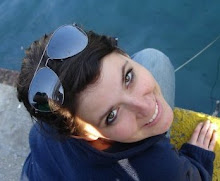
There are many ways to get to Jinja, Uganda, and all of them have two things in common: fear and a recurring urge to hurl. Especially if your mode of transportation is a coach bus of which you had slightly misplaced expectations when you stepped aboard back in Boma.
Trust me, you'll have no regrets about the coach from Boma to Arusha and up through the border between Kenya and Tanzania. It's when you find yourself sitting in the window seat when the driver takes a diagonal turn on unfinished dike in a construction zone in Nairobi that you become very Catholic very quickly. As the engine groans and stretches up over the soft pile of dirt on the high edge of the ditch even the most arrogant of people would convert to the school of penitence. And when you get to the top of the hill and start to feel the road giving out, grain by grain, as the unfinished form sinks under the weight of the bus—that's when you outright pee yourself in between the Hail Mary’s and Lord’s Prayers.
All this for a glimpse of the source of the Nile. This is your life on the line for playing dentist in the mouth of the world's mightiest river. This is why you’re on your way to Uganda.
You can tell when you have crossed into Uganda, and not just because you walked through two huge iron gates guarded by soldiers with rifles when you left Kenya. You can tell because the earth was all of a sudden a deep, rich hue of red buttressing a jungle of incandescent green grasses. The air smelled wet, like the keeper of a lighthouse on the Great Lakes, bearing that fresh, soft scent of tropical moisture responsible for the lush foliage enveloping trees and vines. This precursor to the outskirts of Jinja left you salivating for what you would find further down the road, should you survive the rest of the coach ride. After only moments of crossing the border you can taste the earth, taste the air, taste the endless assault of emerald on your retinas.
Shortly after the border evidence of the great river is already upon you. A giant green hill subsides into a sprawling view of a vast waterbed rising up from the equatorial jungle. As is typical of the African bus system, we were left by the side of the road. But this time, the side of the road has its charms, because it was the last hill before you descend into the valley of the Nile's mouth. The river quickly became a part of my life over the next week as I set up camp in this town of 100,000 that became a bookend of conflict during civil unrest decades back. I found myself in the river a number of times, first dipping in on the edge of some waterfalls, then dropping in headfirst when I bungeed in from a platform built on the ridge of a cliff, then swimming over rapids when our raft capsized on the last leg of a whitewater run, and finally crawling out of the river soaked from head to toe and walking through a native people’s backyard on my way up to a waiting, open-air bus that wound through the northern outskirts of the city like a bear walking on a balance beam. This was my third trip into Jinja from yet another bearing, and it is here on this road coming from the north that you begin to question your definition of poverty.
That’s the thing about poverty, is that it is defined. Many a person sitting on that bus has scanned the modest villages left in the bus’s dust, seeing image after image that fits his or her definition of poverty. Straw-roofed huts, ripped white buildings with broken windows, naked kids running around, meat rotting in the open air. People carry goods on foot and clothes are darkened with sweat and dirt, well-worn and hanging on human frames as if stretched one too many times over a wide loom. If you’re not careful, this is all you see when you’re on one of these roads.
You’ll miss the signature posture of an African woman carrying fruit on her head, perfectly balanced with practiced control. You’ll miss the tempo in their movement, the slow-going, in-every-moment type sense that these people aren’t just nonchalantly walking, running, and moving, but they are feeling every moment of their lives. You’ll miss the remnants of a garden so breathtaking in itself you almost lose your need to see inside Eden. You’ll miss the way the kids’ faces light up as they chase after the bus, chase after you, in between make-believe worlds and playing in the grass.
I’m not saying it’s not a hard life. I’m saying think twice about what you think of poverty. Think past the definition, think past the gag-reflex, think past the pity to see what is actually going on there. You just may see things that redefine how you associate money and happiness, comfort and joy, quality and life. For all the poverty this city faces on a daily basis, when you start looking—seeing—you still see an immutable quality in life there.
If Uganda is a Pearl, then Jinja is its shining face. There is more to tell about Lake Victoria, Entebbe, Kampala, and the roads that connect them all, but it would be best to see them with your own eyes. When you're choosing your path to Jinja, however, I'd stay away from coaches if you can.



No comments:
Post a Comment